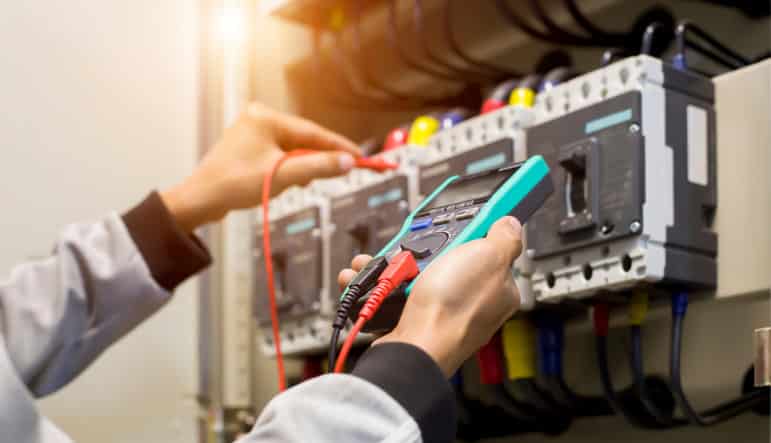Electricians are highly skilled tradesmen; we rely heavily on them to keep society running smoothly. As a result, aspiring electricians must undergo rigorous training to ensure they have the knowledge and tools to do the best job possible.
But searching “electrician near me” won’t guarantee getting the best quality help. There are many practising electricians out there who lack advanced qualifications and experience, two things that all our electricians at Pro Point Electrical have in abundance.
Therefore, the best qualifications to get for an electrician are those which demonstrate a great deal of competence and quality in your work. Completing your Certificate III in Electrotechnology Electrician is a sure way to do this, as it takes around 4 years to complete and focuses heavily on practical training and workplace experience.
For obvious reasons, an electrician’s licence is also one of the best qualifications an electrician can have. It allows you to work individually and without supervision, marking the start of your professional career as an electrician.
Got further questions related to electrician qualifications? Maybe you’re trying to determine “what are the easiest high paying trades?”, or wondering how to get into electrical work. Whatever your motive, we’ve got all the information you need below.
A commercial electrical certificate generally refers to a certification placed on a building or premises that is proof of functioning and safe electricity on the site. They are qualifications for locations as opposed to for electricians, but a fully qualified electrician is the only person who can assign them.
A commercial electrical certificate is typically assigned when electrical tests are done. This is normally after a new build, a renovation, or any site additions are constructed. Types of commercial electrical certificates include Electrical Installation Certificates (EICs), Minor Electrical Installation Works Certificates (MEIWCs), and Electrical Installation Condition Reports (EICRs).
The Level 3 electrician qualification, more accurately known as the Certification III in Electrotechnology, is the more advanced of the major electrician qualifications and allows an electrician to carry out harder electrical tasks. This certification typically requires around 3-4 years to complete and combines theoretical teaching with hands-on work experience.
Level 3 electricians are qualified to design and install overhead and underground connections for premises that link with electrical distributors. This requires more advanced knowledge and is part of a high-paying electrician’s job expectations. To progress further in the field and earn a greater income, aspiring electricians are advised to acquire a Level 3 qualification in electrotechnology.
The highest position an electrician can attain is known as master electrician. They are highly skilled, expertly trained tradesmen with considerable practical experience and a wealth of technical knowledge. They can handle almost any electrical task before them and typically take some of the most complicated electrical systems out there.
To become a master electrician, you must undergo years of training. Completion of a four-year apprenticeship and a further three years of industry experience are minimum. You’ll also need to become a member of the Master Electricians Australia (MEA), either by completing a course with them or by having your credentials evaluated and deemed sufficiently advanced to join. This is the only truly authentic way to become a master electrician in Australia.
An electrician can get several different certifications, but the all-important one is the electrician’s licence. This allows electricians to work unsupervised and marks the start of their professional careers. The other leading electrician qualification is Certificate II in Electrotechnology, which provides fundamental training and teaching. Also known as a Level 2 qualification, it’s required for any aspiring electrician.
Electricians don’t tend to need the highest level of education to do their jobs. Instead, their best electrical qualifications are Certificate II and Certificate III in Electrotechnology. The former lays the foundations for a career as an electrician, teaching fundamentals in practice and safety. The latter is a more advanced qualification and includes complete workplace experience.
Other excellent qualifications for electricians include a diploma, an electrician’s licence, and various additional licences, such as those that allow you to work at heights and in confined spaces. An electrician’s licence will enable you to supply premises with Electrical Installation Certificates (EICs) and Minor Electrical Installation Works Certificates (MEIWCs) – certifications that prove the safety of the electrical systems in place.

